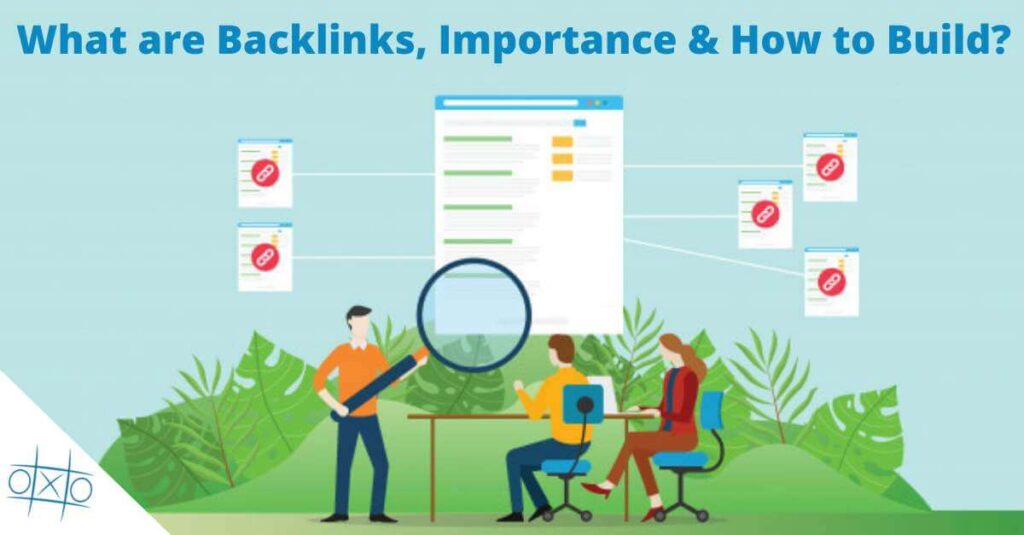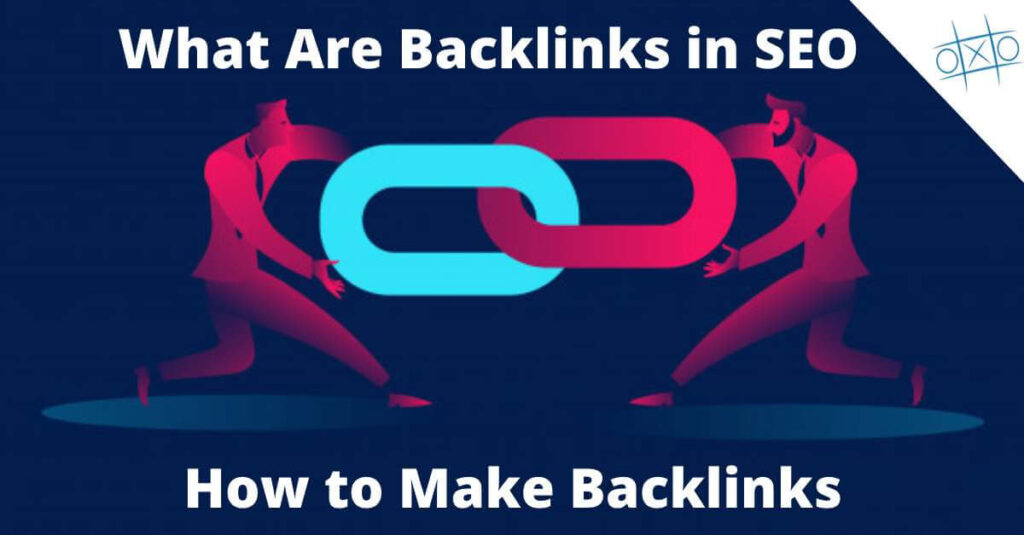
A "backlink" is one of the most used terms in the world for search engine optimization (SEO).
Many bloggers who have recently started a blog or a website often struggle to understand what the word "backlink" means.
In this post, I offer you to understand what backlinks are, why they are important for SEO, and why they are important for your online success. You will also learn how to analyze your competitors' backlinks and get them to your site.
Let's get started...
What is a backlink?
Backlinks are incoming links to a web page.
When a web page links to another page, it is called a backlink. In the past, backlinks were a major metric for ranking a web page. A page with a lot of backlinks is included for higher rankings on all major search engines, including Google. This is still largely true.

Why are backlinks important?
Backlinks are especially important for SEO because they represent a "vote of confidence" from one site to another.
In short, backlinks to your website are a signal to search engines that others will recognize your content. If multiple sites link to the same webpage or website, search engines may find it important to add content, and are therefore able to surf the SERP. Therefore, earning these backlinks can positively affect the ranking position or visibility of the site.
These are the general terms about backlinks that you should know:
Link juice:
When a web page links to one of your articles or your website's homepage, it passes "link juice". This link helps in ranking legitimate articles, and also improves the domain authority. As a blogger, you can block link juice by using the no-follow tag.
No-follow link:
When a website links to another website, but there is no follow tag on the link, the link does not pass the juice of the link. No-follow links are not helpful in terms of page ranking as they do not contribute anything. Typically, a webmaster uses a no-follow tag when linking to a trusted site.
Dow-follow links:
By default, all the links you add to a blog post are dow-follow links and these pass links are interesting.
Adding a Root Domain:
This refers to the number of backlinks from unique domains to your website. Even if a website has been linked to your website ten times, it will only be considered a linked root domain.
Low-quality links:
Low-quality links are links that come from hacked sites, automated sites, spam sites. Such links do more harm than good. This is one reason why you should use caution when buying backlinks.
Internal Links:
Links that move from one page to another are called internal links. This process is called internal linking.
Anchor text:
The text used for hyperlinks is called anchor text. Anchor text backlinks work best when you're trying to rank for specific keywords.
You may also like to read:- How to Do Keyword Research for SEO?
Page Contents
- Advantages of backlinks in SEO:
- 1. Improves Organic Ranking
- 2. Faster Indexing
- 3. Referral Traffic
- How to start getting backlinks:
- 1. Write awesome articles
- 2. Start guest blogging
- 3. Replicate your competitors’ backlinks
- 4. Broken link building
- 5. Submit to web directories
Advantages of backlinks in SEO:
Before we talk about the benefits of backlinks, you need to know that the topic of backlinks has changed a lot in recent years.
There was a time when low quality links also helped in ranking the site. But since Google launched its Penguin algorithm, the whole landscape of backlinking has changed.
It is important to have backlinks from quality sites, and those backlinks must be relevant. If, for example, you have a site about fish, and you are creating links to other places about monkeys, these links will be of no use. Your goal should be to get links from official and related sites.
Let's take a look at why it's important for you to build backlinks to your site:
1. Improve organic rankings
Backlinks help in better search engine rankings.
Important Notice: "SERP" stands for Search Engine Results Page. This screenshot shows only what people see in Google.
Here is an example.
Take the topic "SEO Backlinks".
If I enter this search term into the SEMRush SERP analysis, I can see that most high-ranking pages have a lot of backlink:
If your website is getting links from other relevant sites, then your content will naturally start to rank higher in the search results.
Your goal should be to create links to people who visit your homepage as well as personal posts / pages.
2. Fast indexing
Search engine bots search for new webpages by following backlinks from existing webpages. Only when they find your site can they crawl your site effectively.
Search engine bots will find it harder to find your site if you have no backlinks. Especially for new websites, getting backlinks is important as they help you find and list your site faster.
You may also like to read:- What is SEO? Why SEO is Important to Promote Your Website?
3. Referral traffic
One of the major benefits of backlinks is that they help you get referral traffic. In fact, a person who is reading a post can click on the post link to learn more about the topic at hand.
Because people voluntarily click on links, they are usually more targeted and less likely to leave the page faster (e.g. lower rates).
Generally, referral traffic is targeted and has a low bounce rate.

How to start getting backlinks:
So now you understand what the word "backlink" means as it relates to SEO or digital marketing and why they are important. Let's learn some simple techniques to get new backlinks:
One important fact to keep in mind about backlink SEO is that it is not the number of backlinks that matters, but also the quality of the backlinks.
If you use certain paid services to get links to your site, you may be penalized by Google Penguin's algorithm.
So the question is:
What are some ways to get quality backlinks to your blog?
- Write amazing articles
- Use the broken link method
- Returning the backlinks of your opponents
- Create chorus stone text (column text)
- Start guest blogging
- Submit to web directories
1. Write awesome articles
If you want people to link to you, you need to give them a reason. And the best reason is a terrible article.
If your content is helpful and enjoyable, people will be happy to join.
How do you create an awesome article?
Here are some tips to get you started:
- Problem solving: Most people read the content because they are looking for solutions. Make sure you clarify the exact problem and teach them how to solve it.
- Read your content easily: Write it in short, simple sentences. Make the article less chunky by adding formatting, titles, images, and other multimedia.
- Has a unique angle: There is a lot of content on the internet today. How will your article be?
- Create authority in the article: People want to learn from people with authority on the subject. If you are not one, you can always refer to interviews and experts.
Over the years, we have published many articles on this blog that will help you create great articles without articles:
Once you've published your wonderful post, it's time to send some outreach emails. A good group of people to reach out to are those who publish articles on the same topic. Because they have already written on this topic, they are more likely to be interested in seeing your post.
To find these people, just enter the topic of your article (remember to try out the variations on Google!). Collect a list of articles that appear in SERPs.
Alternatively, you can use a tool like BuzzSumo.
Submit to content analytics, filter (e.g. "English only") and export the list.
Important Note: Such articles are based on accurate research and practical examples.
2. Start guest blogging
Guest blogging is a strategy in which you write a post for other people's blogs instead of your own.
How does it work in the context of link building?
In a nutshell: In exchange for a free article, the blog owner will usually send 1-2 links back to your site within the post.
One of the biggest challenges with guest blogging is finding sites for guest blogs. To increase your chances of being accepted, you can search for sites that are already accepting guest posts. These sites usually have a page for affiliates, such as the "Write for Us" or "Contribute" page. To find these sites, you can use Google's Advanced Search Operators.
Some search operators you can use:
- [your_topic] “write for us”
- [your_topic] “become an author”
- [your_topic] “guest post”
- [your_topic] “guest article”
- [your_topic] inurl:contribute
From there, follow the instructions and submit the pitch.
Another way you can get started is to explore the opportunities for guest blogging in Ahrefs Content Explorer.
Here's why: If a website has already written about a topic, they're obviously interested in it. That way, they might be willing to accept a guest post on that topic, even if they don't have a "Write for Us" page.
To get started, enter a word / phrase into your text.
Click on the "One domain per article" box to get a list of unique domains that you can potentially write. You can also add some more filters to narrow down the list so that you can pitch the blogs you are comfortable writing about.
Some of these sites may not have a write page for us. However, many blogs will accept a guest post if your pitch or topic is good enough.
One way to find good topics on the pitch is to focus on general topics or topics that are already popular on their blogs.
Most blogs offer great articles on their site.
You may also like to read:- 8 Reasons Why Blogging is Important for SEO to Rank Website
3. Earning and giving backlinks
Backlinks are an essential part of off-site SEO. The process of getting these links is known as link earning or link building.
Some backlinks are more valuable internally than others. Backlinks from trusted, popular, high-authority sites are considered to be the most profitable backlinks to earn, while spammy sites from low-authority sites are usually at the other end of the spectrum. Whether or not a link is followed (such as a site owner instructing a search engine specifically to pass, or not, link equity) is certainly relevant, but completely unknown link price is not discounted. Gives. Even just being mentioned on high-quality websites can boost your brand.
Just as some of the backlinks you earn are more valuable than others, the links you make to other sites vary in value. When you link to an external site, the options associated with the page you choose (its page authority, content, search engine access, and more) use the anchor you use, regardless of the link you link to. Choose to follow or pause, and any other meta tags associated with the linking page can greatly influence the value you provide.
4. Replicate your competitors' backlinks
Your site may be new, but you have no opponents. It means two things:
They are likely to get a lot of backlinks
They have built their own link building (so that they can rank better).
You can use it to your advantage. Find out how they're getting your links, and repeat them.
To do this, you need to use a tool in SEMRush called Keyword Gap. This handy tool tells you who is connecting most of your competitors, but not you.
In the screenshot below, you can see that it clearly shows the websites that are linking to all the sites that compete closely with me. What I will do is analyze the results and find out why they belong to my competitors, but not to me.
Add your competitor's equipment, and click "Find Possibilities."
Then, I'll send an email and see if I can find those links! I will share email outreach techniques in future articles. When we publish the guide, you can subscribe to our newsletter.
- Competitive backlink search
New sites or those that increase their keyword footprint may find it difficult to know when to start link building. This is where competing backlink search comes in: By testing backlink profiles (a collection of pages and domains) that are already getting good rankings for your target keywords, you can get information about link building, which helps. Backlink tools like Link Explorer can help expose these links so that you can target those domains in your link building campaigns.
You may also like to read:- What is Social Media Marketing, and Why Social Media is Important for Business?
5. Broken Link Building
The web is constantly evolving. Pages are changed, moved or deleted all the time. Broken links are links to a website or page that no longer exist, or have been deleted.
No one likes, Webmasters and searchers hate broken links because they contribute to a poor user experience.
But, they still exist because webmasters are busy. It takes a lot of effort to free your site from constant broken links.
This strategy takes advantage of the same. The concept is simple:
- You find a broken link
- You rebuild dead content
- You reach people who link to that dead content and ask them to link to your recreated version.
The most important part of this strategy is finding the right "broken" material to recreate and pitch. To do this, you will need a tool that allows you to analyze backlinks.
Enter the domain of an official, competing for site in the Ahrefs Site Explorer. Then, go to Best by Link Report, and filter by "HTTP 404 not found".
As you can see, the second page of this screenshot is dead, but 113 dofollow backlinks were attached to it first. This is a great opportunity!
The Wayback Machine tells me that it used to be a post about the difference between metaphors, similes and similes.
Now all you have to do is recreate this content and link all 113 people to you instead.
6. Submit web directories
Submitting your blog to a web directory is another easy way to get backlinks.
That said, this method is not very popular these days because it is not easy to find a legal web directory. You should especially avoid web directories that ask you to create a backlink to their website to bring your website to their directory.
Also important: If you are using an automated direct submission strategy, stop doing so immediately. Automated website submission will display your blog as spam, and it can cost you dearly in case your blog is completely removed from your domain authority or search engine.
We hope this article will help you know the basics of Off-Page and backlinking in SEO, and why backlinks are important for blogs or websites to rank on Google or other search engines.
Are you currently working on getting backlinks for your blog? Tell us about your experiences in the comments section below.
